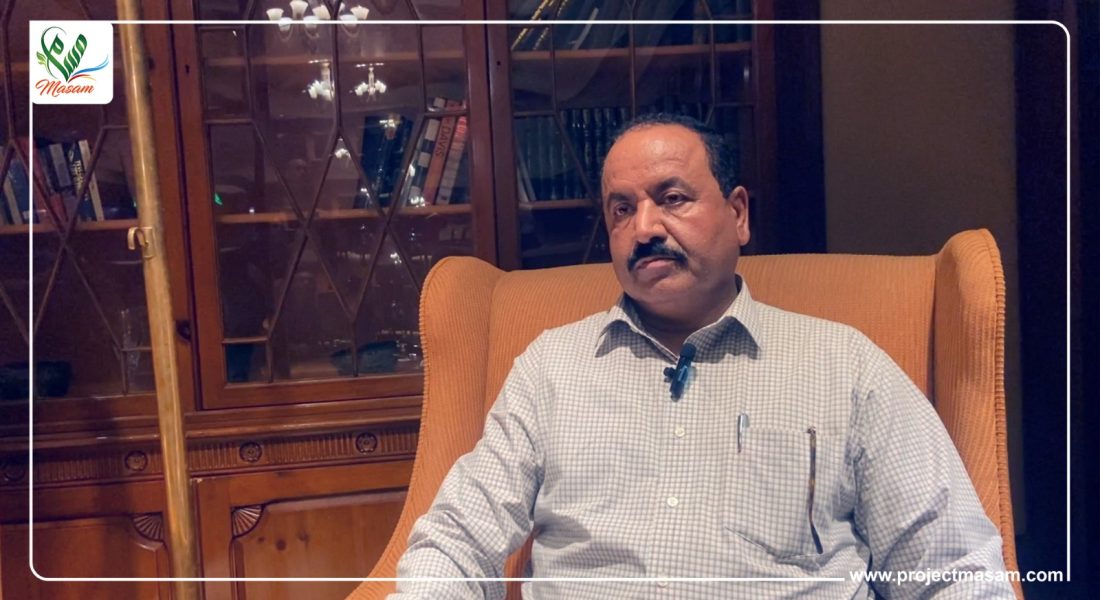Brigadier General Ameen al-Aqili, director of Yemen’s National Mine Action Programme, has said that landmines have killed more than 10,000 civilians in Yemen, with the number of deaths expected to be significantly higher than current reports.
In a recorded interview with Project Masam, al-Aqili explained that mines have spread widely and significantly in Yemen since the Houthi militias began to take control of areas in several governorates of Yemen, starting from the Saada governorate to Amran and Sana’a. They then spread to Taiz, Aden, Al-Bayda, Al-Dhalea, Hodeidah, Abyan, Al-Jawf, Hajjah, and even Dhamar, Ibb, and Raymah.
Al-Aqili added hat the Houthi mines caused the death and injury of thousands of civilians, who were the first victims of this crisis.
“We have documented statistics of the landmine victims, including those killed, amputees, disabled children, women, and young people whom we could reach”, he said. “Another catastrophe is represented in the fact that civilians and farmers can’t reclaim their land, which they depend on, as you know that agriculture and fishing represent the main sources of livelihood for the majority of the Yemeni people”, Al-Aqili said.
He added that even the seas have not been spared from those mines planted by the Houthi militias.
Reporting landmine victims: a dilemma
The Brigadier General said that Yemen Executive Mine Action Centre (YEMAC) teams and the Saudi Project Masam have been clearing landmines and other remnants of war since mid-2018, clearing Yemeni land and documenting the numbers of mine victims in the areas they could have access to.
“We have documented and proven statistics of more than 10,000 mine victims, and in fact, we know that the real numbers of those who have fallen victim to mines are much bigger, but this is what came to our knowledge and we could document”.
He continued: “Several agencies have documented large numbers of landmine victims, but we depend on our reliable sources, and I reiterate that the number of mine victims is much higher than the documented figures, as landmines have caused a great humanitarian disaster for civilians, who, unfortunately, were the first targets of mines”.
Targeting The Vital Facilities
“Economically speaking, mines have deprived farmers from working on their farms. They contaminated all areas the Houthis expanded in. [Civiliand living in] cities and villages were deprived of practicing their businesses since roads and shops were laid with mines. Even the Aden airport was planted with landmines, and now the Hodeidah airport,” Al-Aqili reiterated.
As to education, landmines have been planted in schools, universities, institutes, roads, and in many other places, the director said, adding that students have also paid the price, wit many wounded or killed.
“We have to refer here to the Houthi militias’ skill in camouflaging, and hiding their explosives in order to deceive civilians and target the largest possible number of them,” he said.
The militias further booby-trapped main roads that were used by civilians to access their food supplies and to return to their villages from which they were displaced. Had it not been for the YEMAC and Project Masam, which implemented an emergency plan to open roads, help the displaced people who lost their homes and land return to their villages, and clear many villages, schools, and civilian houses that were planted with remnants of war and mines, the situation would have been even more dire, the director added.
‘Limited international support’
In his interview, Al-Aqili claimed YEMAC has been let down by the international community.
“The United Nations gave us limited support, which they used to stop unjustifiably and illegally. For example, the UNDP unfortunately reduced the financial support allocated to us a year and a half ago, although it had not been enough,” Al-Aqili said. “Therefore, in 2022 we had to reduce the number of the YEMAC [demining] teams. We also stopped a number of surveying, demining, clearance, and mine risk-educating teams due to the reduction of financial support.”
He added: “In the first half of the current year 2023, the financial support was reduced by 50%, and in July of this year, the support was stopped permanently, which forced us to stop the activities of the Yemen Executive Mine Action Centre with its departments except for the departments responding to emergencies with very simple efforts.”
According to Al-Aqili, the United Nations’ decision to pull funding and staff out came out of the blue.
“Unfortunately, the suspension of funding was not justified and we were not convinced of what they were telling us about the donors’ reduction of their funding. I think that there are certain political motives, some of which are not known to us, but this is what we understood during our contacts with them,” Al-Alqili claimed.
“We also felt like being blackmailed in this respect. But we will continue to work and exert more effort because we are speaking about our country and people, and we cannot abandon our humanitarian mission of removing mines and clearing the land,” he insisted, adding: “We would like here to extend our thanks and appreciation to the Saudi program Masam, which did not stop for even one day during our five-year-long partnership”.
Al-Aqili recalled that during the spread of the coronavirus epidemic, all vital, civil and military facilities were affected as a result of the pandemic, and Yemen was part of the world that was largely affected by the crisis. However, the YEMAC director explained, Project Masam took all the necessary preventive measures and did not pause as their teams continued to work, and were able to make great progress and save the lives of civilians.
Calls for international community support
“We call upon the international community, organisations, our brotherly states, and our people in the Arab countries and Saudi Arabia to support us in these difficult circumstances that the country is going through, particularly the demining activities, so that the teams affiliated with the National Mine Action Program will not stop their efforts completely, since the stopping of the work of one or several teams means an increase in the number of victims. In fact, failing to carry out our demining mission will definitely cause a greater humanitarian disaster among civilians, whose safety and security are our ultimate goals. We are also working to help the displaced return to their villages and cities that now have their safety restored”, he said.
The YEMAC director reverted back to his concerns regarding mine action programme funding in Yemen.
“Back again to the UNDP, unfortunately, we are still talking with them, but we have not seen any glimmer of hope that they will be transparent in this aspect. I talked with them a lot even when they were still offering their previous funding, but they were not frank with us. As an official body responsible for all mine action activities in Yemen, there was no transparency with regards to the funding issue, how it was spent, how much was left of it, and what our plan was for the next year.”
He added: “Although we had a plan in this regard, which was approved during the 20th Meeting of the States Parties to the Ottawa Agreement in Geneva, the funding was stopped for an unknown period of time and we do not know exactly when it will be resumed or if there will be transparency or that the situation will remain as is,” Al-Aqili said. “On the other hand, we do appreciate all the donors who supported Yemen in its crisis, [and we are] putting our blame only on the UNDP, which has not been transparent with us since the beginning of the 2016 emergency response plan,” he added.
YEMAC and Project Masam cooperation
Al-Aqili claimed that YEMAC now fully relies on the Project Masam for its emergency response, as they receive emergency reports from civilians, both at the National Mine Action Program and the Project Masam Operations Room about new areas where the presence of landmines was not knows, but where mines have been discovered and caused harm to people.
Immediately the teams move on the same day to high-priority areas that pose threats to civilians. After the YEMAC stopped working, except for the emergency teams that work with the simplest tools and without any insurance, they now rely mainly on Project Masam project to deal with the current crisis.
“I would like to offer Project Masam and the Kingdom of Saudi Arabia all thanks and appreciation for their presence on the ground and their efforts in technical advisers and training instructors and modern equipment, which has made it easier for us to work effectively on the ground,” he said.

